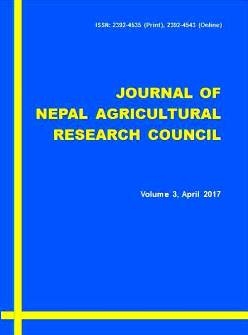Adoption of Improved Potato Varieties in Nepal
DOI:
https://doi.org/10.3126/jnarc.v3i1.17274Keywords:
Adoption, potato, sources of seed, training, varietiesAbstract
Nepal is one of the top twenty countries where potato contributes substantially for the human diet. Enhancing adoption of improved potato varieties could impact on farmer’s income, household food and nutritional security. As such, using a multistage sampling procedure, a study was conducted to assess the determinants of improved potato varieties adoption in Nepal covering 180 samples in four districts, two in hills and two in Tarai region. The study revealed that; Kavre and Bardiya districts in the hills and Tarai, respectively, were dominated by improved potato varieties adoption. On the other hand, Dhankuta and Jhapa in the hills and Tarai, respectively, were dominated by local potato varieties adoption. The informal seed sources followed by agro-vet and market were the major sources for improved varietal adoption. Farmers’ accesses to training and formal seed sources were important factor determining improved potato varietal adoption. However, households with larger farm size were less likely to allocate more area for improved potato varieties as many of farmers were reluctant to take potato cultivation as agri-business and still follow subsistence farming. Potato R&D programs, therefore, need to strengthen formal seed system to enhance access to quality potato seeds and build producer’s capacity through regular training and exposer visits in order to improve adoption of improved potato varieties in Nepal.
Journal of Nepal Agricultural Research Council Vol.3 2017: 38-44




